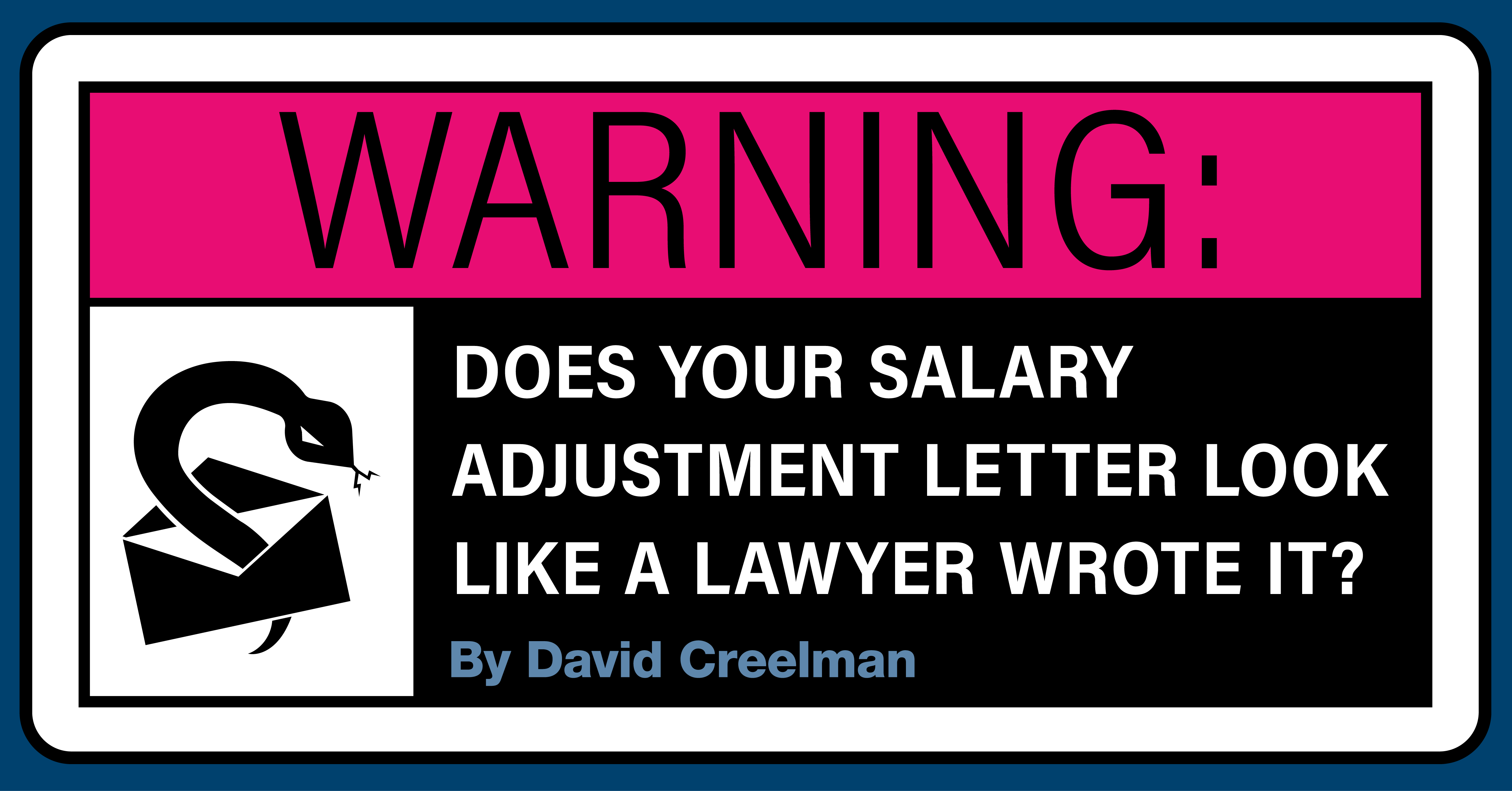
This is the fifth article in an ongoing series by David Creelman about redesigning compensation planning to acquire and retain top performers. This week’s article is about salary adjustment letters. To catch up on our previous discussion, read the fourth article by clicking here.
The title of this article probably doesn’t need much explanation. Salary adjustment letters generally look like lawyers wrote them. They are often rigid to the point of being unsettling; stiff to the point of being ungracious. It doesn’t need to be this way. Salary adjustment letters can be an opportunity to connect to employees and reinforce your company’s brand.
The time for investing in effective communication is now, as employee retention has rocketed up in priority amid The Great Resignation. Warm, authentic messaging will play a critical role in how employees feel about their organization. It bears repeating that employee compensation is a big (often the biggest) expense in organizations. It’s a missed opportunity to consider reward communication as a strictly factual report.
A Simple Example To Avoid
What should a salary adjustment letters not sound like? Take this example below:
[NAME], ABC Corporation is pleased to award you a pay increase. Senior staff considered individual employee performance, company budget, labor grade adjustments, CPI, and current labor conditions in determining this increase.
Your new salary of [X amount] will be effective from [X date]. All other terms and conditions remain unchanged. Please note this salary increase is unique to you and we ask that you do not discuss your award with other members of the team.
Your bonus amount is not to be shared with anyone else. DO NOT share your pay or any other compensation with others. It is very unprofessional.
Congratulations and thank you for your hard work!
Do you see the issues? To start, the email/document title makes the letter sound formal and stiff. The employee’s new salary is also communicated in an unfriendly, clinical manner. It doesn’t include details like why the raise is competitive or how it was earned. Then, the letter becomes nearly hostile with a menacing tone about sharing compensation details. Instead of being encouraging and grateful, the letter is dismal and unexciting.
This letter is not a work of fiction. Every line above was taken from a real salary adjustment letter that was handed out to a real person. This is the composite state of salary award letters even in 2022.
A Simple Example To Consider
What should salary adjustment letters sound like? Here is a simple example of a warmer salary adjustment letter followed by some ideas for consideration.
[NAME], ABC Corporation had a good year, and your contributions were vital to our success. We appreciate the skill and effort you brought to your work. As a result of your contribution, we are increasing your salary from [current amount] to [new amount]; that is an increase of [x%]. Additionally, we have improved the benefits you receive by [insert details]. This adjustment will take place with effect from [date].
Our company’s mission is to [insert description], and next year we hope to [something about next year’s plans]. It is an honor to have you as a part of our team working on this mission.
Even a simple letter like this is a step in the right direction. Here are some other ideas to consider:
- Design: Make sure the graphics are attractive and match your brand.
- Personalization: Make the letter as personal as possible; consider asking managers to include a personalized note for each employee.
- Total Reward: Consider including or linking to your total reward information.
- Mobile Friendly: We may think of salary adjustment letters as a piece of paper, but these days many employees now access them on their phones. Is your communication format mobile-friendly?
- Mobile Enhanced: If people read the salary adjustment letter on a PC or smartphone, this is a great opportunity to add links and animations. There may be ways you can enhance your impact by leveraging the fact that people read the letter online.
- Additional Information: You can use the letter to remind employees of an upcoming town hall, staff party, or leader ‘ask me anything’ online session.
Peter Navin, Chief People Officer for the US Olympic & Paralympic Committee, says you should never miss an opportunity to connect to and inspire your people, and the salary adjustment letter is one such opportunity. He also urges that the message should underline the importance of their contribution to organizational performance and that the organization is investing in them due to that contribution.
Who Owns Reward Communications?
Okay, so we’d like to have better reward communication but who should take the lead? The answer is not the head of total reward. Instead, the leader should be the head of communications working in conjunction with the reward team.
Why is reward communication handled so poorly? Because reward is not viewed as meaningful communication, it’s only seen as an administrative report. The main goal for a strategic HR leader is to signal to the people in reward and in employee communications that a salary adjustment letter is a critical opportunity to reach out to all employees.
Conclusion?
What is your plan of action for the compensation function? Is it playing defensively in the war for talent by staying compliant, or is it playing offensively by focusing on talent acquisition and retention? HR leaders have an opportunity to take the overlooked power of the compensation function and turn it into a strategic weapon to drive business performance. It all starts with a mindset that recognizes the untapped potential of reward. ⬤

